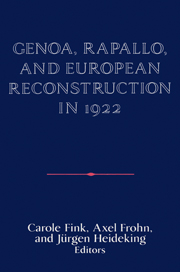Book contents
- Frontmatter
- Introduction
- 1 Beyond Revisionism: The Genoa Conference of 1922
- 2 The Genoa Conference of 1922: Lloyd George and the Politics of Recognition
- 3 A Rainy Day, April 16, 1922: The Rapallo Treaty and the Cloudy Perspective for German Foreign Policy
- 4 Reparations in 1922
- 5 Germany and the United States: The Concept of World Economic Interdependence
- 6 American Policy Toward Debts and Reconstruction at Genoa, 1922
- 7 French Plans for the Reconstruction of Russia: A History and Evaluation
- 8 The Oil Problem and Soviet-American Relations at the Genoa Conference of 1922
- 9 Italy at the Genoa Conference: Italian-Soviet Commercial Relations
- 10 The European Policy of Czechoslovakia on the Eve of the Genoa Conference of 1922
- 11 The Genoa Conference and the Little Entente
- 12 The Role of Switzerland and the Neutral States at the Genoa Conference
- 13 The Genoa Conference and Japan: A Lesson in Great-Power Diplomacy
- Maps
- Appendix
- Bibliography
- Contributors
- Index
12 - The Role of Switzerland and the Neutral States at the Genoa Conference
Published online by Cambridge University Press: 05 January 2013
- Frontmatter
- Introduction
- 1 Beyond Revisionism: The Genoa Conference of 1922
- 2 The Genoa Conference of 1922: Lloyd George and the Politics of Recognition
- 3 A Rainy Day, April 16, 1922: The Rapallo Treaty and the Cloudy Perspective for German Foreign Policy
- 4 Reparations in 1922
- 5 Germany and the United States: The Concept of World Economic Interdependence
- 6 American Policy Toward Debts and Reconstruction at Genoa, 1922
- 7 French Plans for the Reconstruction of Russia: A History and Evaluation
- 8 The Oil Problem and Soviet-American Relations at the Genoa Conference of 1922
- 9 Italy at the Genoa Conference: Italian-Soviet Commercial Relations
- 10 The European Policy of Czechoslovakia on the Eve of the Genoa Conference of 1922
- 11 The Genoa Conference and the Little Entente
- 12 The Role of Switzerland and the Neutral States at the Genoa Conference
- 13 The Genoa Conference and Japan: A Lesson in Great-Power Diplomacy
- Maps
- Appendix
- Bibliography
- Contributors
- Index
Summary
Prior to World War I, very few European states possessed a statute of neutrality. Europe was dominated by the great empires and by the new and expanding nation states. The few small states were, for the most part, located in disputed areas between the Great Powers and were frequently assigned the role of buffer states.
Switzerland, which over the centuries had asserted its right to a statute of neutrality, had been the subject of guarantees by the Great Powers. In the Acts of the Congress of Vienna in 1815, the signatories had recognized that “the neutrality and inviolability of Switzerland and its independence from all foreign influences are in the best interests of the political structure of all of Europe.” After its independence in 1831, Belgium too had benefited from international guarantees, which were reinforced by a statute of perpetual neutrality in the 1839 treaty. This statute was respected by the Great Powers until the German invasion in 1914.
During the nineteenth century, a period characterized by the growth of nationalism and the formation of nation states, the small state appeared to be an outdated concept that contraindicated the general tendency toward the creation of large political/economic entities such as Germany and Italy. In Scandinavia, on the other hand, the Swedish-Norwegian union was dissolved in 1905. At the beginning of the twentieth century, a new volatile spirit emerged in some of the small states in the Balkans, but neither Switzerland nor the Scandinavian states attempted to increase their power through an alignment with one or another of the Great Powers.
- Type
- Chapter
- Information
- Genoa, Rapallo, and European Reconstruction in 1922 , pp. 201 - 216Publisher: Cambridge University PressPrint publication year: 1991



